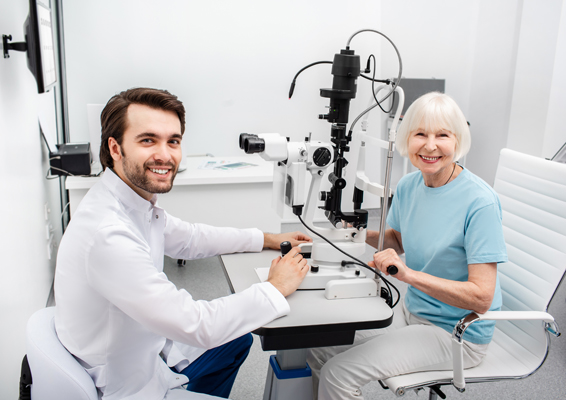



A diabetic eye exam can be a life and vision saver for a diabetic. Diabetes is a serious disease and one that can be difficult to manage. Medication, proper diet and exercise, and regular medical care can be helpful for controlling blood sugar levels and reducing serious damage to the body. In spite of best efforts, however, sometimes conditions develop that diabetics can find scary and confusing. Diabetic retinopathy is one that can be confirmed in a thorough exam.
What causes diabetic retinopathy?
Diabetic retinopathy is a disease in which the optic nerve to the retina begins to deteriorate. High blood sugar can weaken and thin the blood vessels in the eye. High blood pressure, frequently a side effect of high blood sugar, can cause bleeding within the eye as the pressure pushes it through the thin vessel walls. This can cause darkening of vision and untreated, can lead to glaucoma or cataracts or make those conditions worse.
What are the warning symptoms?
There are several things that can lead a person to suspect they have diabetic retinopathy. Although some are also symptoms of other things, a person with diabetes should never overlook any of these:
- Blurred vision (may also be a sign of uncontrolled sugars)
- Dark or blank areas in the field of vision or a change in color perception
- Flashers and floaters or small moving objects in the field of vision
- Sudden onset of partial or complete vision loss
- Difficulty focusing, even with glasses
How can a diabetic eye exam help?
An optometrist can perform a series of tests to see how severe the damage is and make an assessment as to possible treatments. The first thing a doctor is likely to do is to dilate the eyes so that the back of the retina can be seen. A special dye is injected that makes the blood glow, rendering it more visible in the pictures that are taken. The doctor typically also checks the pressure in the eye as a baseline to monitor the possible complication of glaucoma. A standard vision test may also be given to judge progress or deterioration of vision during treatments.
What treatments can the doctor perform?
Focus or scatter laser treatments may be administered to help cauterize active bleeds and shrink swollen vessels. There may be injections given in the eye that can help to “dry up” or dissolve the bleeding. If none of these treatments clear the vision field, a vitrectomy may be performed. This procedure essentially removes the debris-filled fluid and scar tissue in the eye and replaces it with clean fluid. The recovery period can be around two weeks.
Conclusion
Prevention through maintaining lower blood sugar levels and getting blood pressure down so it doesn’t cause bleeding in the eye are critical steps to avoiding this potentially blinding disease. Make sure to have a regular diabetic eye exam and go in as soon as possible if any of the above symptoms occur. This will give you the best chance of getting on top of the problem.
Request an appointment here: https://www.carmieyecare.com or call Carmi Eye Care at (618) 374-0513 for an appointment in our Carmi office.
Check out what others are saying about our services on Yelp: Diabetic Eye Exam in Carmi, IL.
Related Posts
Cataract treatment often restores clarity and color, but vision continues to improve as the eyes heal. Knowing what to expect reduces worry and helps you prepare. With simple habits and timely follow-up, most people return to a comfortable, clear vision.After a patient receives a replacement for their cloudy lens, the world looks brighter and sharper.…
Eye exams can detect vision changes and maintain eye health. However, seasonal allergies can sometimes complicate the process. Redness, itching, tearing, and swelling, among other allergy symptoms, can easily skew results. By understanding the potential impact of seasonal allergies on eye exams, patients can take steps to ensure a more comfortable and effective visit with…
To keep contact lenses convenient and effective, it is important to take proper care of them, especially in the summer. Increased heat, outdoor activities, and exposure to water can all impact comfort and eye health. Following a few do’s and don’ts makes it possible to enjoy clear vision and protect the eyes all summer long.Summer…
You may be wondering whether progressive lenses are right for you and your vision. In the past, bifocals and trifocals may have been the choice for your needs. Today, the optometrist may recommend this update to effective vision. Before you get too serious about these types of lenses, it is good to learn more. As…


